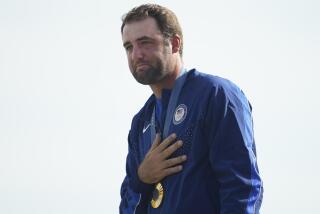Gold or Bust ... and Bode Busts
- Share via
DEER VALLEY, Utah — Fans flocked here Saturday to see history made in the men’s slalom, and history, indeed, was made.
It was not rendered by home-country favorite Bode Miller, though. It was etched in soft snow by a Scot, with a brogue, skiing for Great Britain.
It was a strange day from the start-gate get-go, one that ought to be spliced and forwarded to “Alpine’s Funniest Home Videos.”
Seventy-seven racers started the day, but only 34 finished, the other 43 skiing up, down and off the course in a series of almost comical pratfalls and face plants.
Among those left standing in the end were France’s Jean-Pierre Vidal, who won the gold medal with a two-run time of 1 minute 41.06 seconds. He was joined on the podium by countryman Sebastien Amiez, who finished 0.76 back to claim the silver and Alain Baxter of Great Britain, who fell into the bronze with a time of 1:42.32.
The bronze was Great Britain’s first ever in Alpine skiing.
Baxter was not even in the finish area when he received the good news.
“I was in the tent, taking my boots off,” he said.
Miller? He was trying to become the first U.S. Alpine skier to win three Olympic medals but ended up 25th, sandwiched between a Bulgarian and a Latvian.
Did we say it was a strange day?
Miller was faced with an intriguing choice after finishing second in the first run.
Vidal held an 0.36 advantage over Miller, but after that the bottom dropped out of the field. Miller had almost a second lead over Benjamin Raich, third after the first run.
Miller could have raced conservatively and probably assured himself of his third silver medal in the Salt Lake Games.
Playing it safe, though, has never been Miller’s style. This guy once skied out of 17 consecutive World Cup slaloms.
There was no doubt in his mind or anyone else’s about the options: Bode was going for the gold.
He bolted out the start gate on his second run and lasted only about 20 seconds on course when he caught an edge and went off course. Miller recovered to make the gate, but his second-run time of 1:04.42 was only good enough to beat a Turk and a Hungarian.
“I was going for it,” Miller said. “I was going for gold. That’s the way it is.”
Did Miller consider playing it safe?
“If I could guarantee myself silver if I backed off, maybe I would have done that,” he said. “But there are no guarantees. If I had backed off and come down in fifth place, I would have been really disappointed.”
Miller began the race as the No. 2 slalom skier in the world but didn’t even end up as the top American finisher.
That honor went to Chip Knight, who finished 12th. Erik Schlopy, who withdrew from his specialty, the giant slalom, after a poor first run, finished 14th in the slalom.
Tom Rothrock, who earned a second-run start in the top group after racing to 15th place from the 34th start position, had a great opportunity to crack the top 10 or better, but he skied off course on his second run.
Rothrock wasn’t alone.
An unusual set of snow conditions made for a treacherous track. Temperatures in Deer Valley were warm, in the 40s, which made it difficult for racers to dig their edges into the snow.
The race became a matter of survival. Five of the top 15 racers in the second run failed to finish, and that’s not counting Miller, who skied off course but eventually made his way down.
Vidal, skiing last, knew the race was his to lose after Miller faltered. Vidal had a huge time advantage from his first run. Even though he skied tentatively and gave a lot of that time back, Vidal still won the gold with relative ease.
“I knew he will take all the risks,” Vidal said of Miller. “And that if he is in the finish corral it will be very difficult for me, that I must do the best I can. But when I knew that he is out, if I just finish the race, it is OK.”
Saturday marked the first time the French have finished first and second in an Olympic Alpine event since Jean-Claude Killy won gold and Guy Perillat the silver in downhill at the 1968 Grenoble Games.
The story of the day, though, belonged to Baxter, who made Alpine history for Great Britain.
Baxter, a native of Aviemore, Scotland, also became the first skier to deliver his post-race news conference in a thick brogue.
“The course was ripple-y,” he said. “Your skis were chatterin’. You couldn’t get a good carve in thar like it had been all week.”
Baxter, who said he once ranked 180th in the world, grew up watching Alpine races on television broadcasts known as “Ski Sundays.”
Baxter’s luck began to change when the British ski team brought in hired guns, the Austrians, as coaches. Baxter eventually moved his full-time training to the Alps.
“I pretty much live in Austria in the winter,” he said. “We pretty much train like the Austrians.”
The work paid off. Alain’s brother, Noel, finished in 21st in Saturday’s race, and Gareth Trayner, another Brit, ended up 23rd.
All three Brits can go home and brag to their friends that they defeated the great Bode Miller in the men’s Olympic slalom.
Baxter said he figures he’ll get a fine reception back home.
“The Scots are known to party, you know?” he said.
More to Read
Go beyond the scoreboard
Get the latest on L.A.'s teams in the daily Sports Report newsletter.
You may occasionally receive promotional content from the Los Angeles Times.







